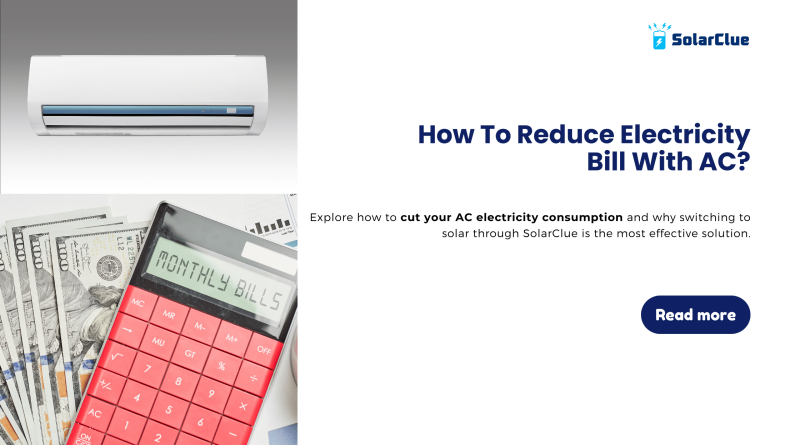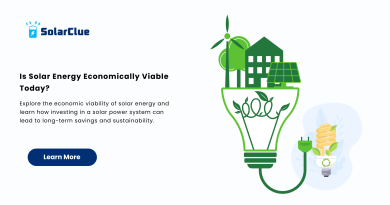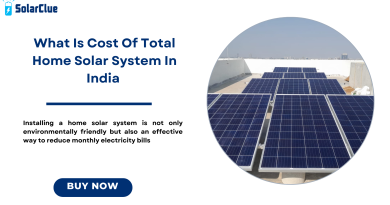How To Reduce Electricity Bill With AC?
With the rise in energy costs and the heavy reliance on air conditioners (AC) during hot weather, electricity bills can skyrocket, making energy efficiency a top priority. While optimizing AC usage can reduce some of the costs, switching to solar power is a more sustainable solution. Solar energy provides a significant reduction in electricity bills, especially for heavy AC users, and offers a long-term return on investment. In this blog, we’ll explore how to cut your AC electricity consumption and why switching to solar through SolarClue is the most effective solution.
Table of Contents
- 1 Effective Ways to Reduce Electricity Bill with AC
- 2 2. Use Energy-Efficient ACs
- 2.1 3. Regular AC Maintenance
- 2.2 4. Optimize AC Usage
- 2.3 Why Solar Power is the Ultimate Solution to Cut AC Electricity Bills
- 2.4 Solar vs. Traditional Energy for AC Use: A Cost Comparison
- 2.5 Why SolarClue is Your Best Option for Solar Power Solutions
- 2.6 How Solar Power Helps You Beat Rising Electricity Costs
- 2.7 Call to Action: Invest in Solar with SolarClue Today
Effective Ways to Reduce Electricity Bill with AC
1. Set the Right Temperature
One of the simplest ways to save on your electricity bill is by setting your AC to the right temperature. Experts recommend keeping your thermostat between 24-26°C, as this is the most energy-efficient range. For every degree below this, the energy consumption increases significantly. Maintaining the right temperature ensures a comfortable indoor climate without putting a strain on your electricity usage.
2. Use Energy-Efficient ACs
When purchasing a new air conditioner, always consider energy-efficient options such as inverter ACs or models with higher energy star ratings. Inverter technology adjusts the compressor speed based on the cooling needs, resulting in less energy consumption compared to conventional ACs. Although these models might have a higher upfront cost, they provide long-term savings through reduced energy use.
3. Regular AC Maintenance
An often overlooked factor in energy savings is AC maintenance. Dirty filters and coils reduce the efficiency of your AC, causing it to work harder and consume more electricity. Regularly cleaning or replacing filters, and scheduling professional maintenance checks, ensures that your AC operates at its peak performance and minimizes electricity consumption.
4. Optimize AC Usage
Using your AC efficiently can drastically cut down energy use. Employ features like timers and sleep mode, which adjust the cooling based on your needs. Additionally, using ceiling fans in conjunction with your AC improves air circulation, allowing you to set the temperature a little higher without sacrificing comfort.
Why Solar Power is the Ultimate Solution to Cut AC Electricity Bills
1. Solar Power Cuts Energy Bills by Over 50%
One of the most effective ways to slash your electricity bill—especially during summer when AC usage is high—is by installing a solar power system. Solar energy can power your home, including your AC, with no cost after installation. Households switching to solar often experience more than 50% savings on their energy bills, making it a sustainable and cost-effective solution.
2. Environmentally Friendly and Renewable
Unlike traditional electricity, which relies on non-renewable energy sources like coal or gas, solar power is 100% renewable and environmentally friendly. By harnessing the sun’s energy, you reduce your carbon footprint while enjoying long-term savings. Solar energy not only lowers electricity bills but also contributes to a cleaner, greener planet.
3. Return on Investment (ROI) with Solar
Solar power systems have a higher initial cost compared to standard electricity, but the return on investment is undeniable. On average, a solar power system pays for itself within 4-7 years, depending on your energy consumption and the size of the system. After the payback period, the energy you generate is essentially free, resulting in substantial savings over the life of the system, which typically lasts 25 years or more.
Solar vs. Traditional Energy for AC Use: A Cost Comparison
| Factors | Traditional Energy (Electricity Grid) | Solar Energy |
|---|---|---|
| Monthly Electricity Bill | High, especially during summer months | Low or zero, depending on setup |
| Carbon Footprint | High | Minimal |
| Initial Investment | None (pay as you go) | Higher upfront cost, long-term savings |
| ROI | No direct return | Payback in 4-7 years, then free energy |
| Energy Source | Non-renewable | 100% Renewable |
Why SolarClue is Your Best Option for Solar Power Solutions
1. Trusted Brands at SolarClue
SolarClue provides only the best, top-tier solar power brands in the industry, ensuring quality and reliability. Leading brands like Tata Power, Luminous, and Havells offer durable, high-performance solar panels, inverters, and batteries. When you invest in a solar system from SolarClue, you’re assured of the highest industry standards and products that deliver optimal performance for years to come.
2. Personalized Guidance
Every home and energy need is different, which is why SolarClue offers personalized guidance tailored to your specific requirements. Their team of experts conducts detailed assessments of your home’s energy needs, roof space, and budget to recommend the best solar power system for you. This ensures you get the maximum return on your investment.
3. End-to-End Service
SolarClue provides a full-service solution, including consultation, installation, and post-installation support. From the moment you decide to explore solar power options, SolarClue guides you through each step, ensuring a smooth and hassle-free experience. Their team handles everything—from paperwork to installation—allowing you to focus on enjoying your energy savings.
How Solar Power Helps You Beat Rising Electricity Costs
1. Energy Independence
By generating your own electricity with a solar power system, you protect yourself from rising electricity prices. Electricity tariffs increase over time, but with solar energy, you achieve energy independence. You generate your power and shield yourself from the uncertainties of the electricity market.
2. Government Incentives
In addition to saving on electricity bills, solar energy comes with government incentives that make the switch even more affordable. Various tax rebates, subsidies, and incentives are available for solar installations, further reducing the upfront cost and shortening the payback period. SolarClue helps customers take advantage of all available incentives, maximizing their return on investment.
Call to Action: Invest in Solar with SolarClue Today
Tired of dealing with high electricity bills, especially during peak AC usage? SolarClue offers premium solar power systems that can reduce your electricity bill by more than 50%, while providing a greener, more sustainable solution. With SolarClue, you can expect the best solar brands, expert installation, and personalized guidance tailored to your needs.
Contact SolarClue today to explore how solar power can reduce your electricity bills, provide energy independence, and deliver a strong return on investment in the future.
FAQs
1. How much can I save on my electricity bill by using solar energy for my AC?
Switching to solar power can reduce your overall electricity bill by 50-90%, depending on the size of your system and energy usage.
2. Is solar energy reliable for powering air conditioners?
Yes, solar energy is reliable for running air conditioners. With the right system size, you can power your AC along with other household appliances.
3. What are the upfront costs for a solar power system?
While the upfront costs for solar systems can vary, government incentives, subsidies, and long-term savings make it a worthwhile investment.
4. Does SolarClue offer financing options for solar power systems?
Yes, SolarClue offers flexible financing options and helps customers explore government incentives to make the switch to solar more affordable.
5. How long does it take to install a solar power system?
On average, solar power systems take 1-3 days to install, depending on the size and complexity of the system.



